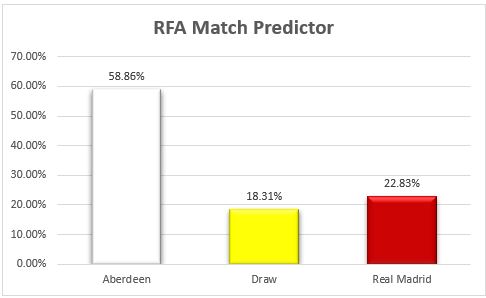Since a 2-1 loss to Rangers on April 9th, the Dons were riding a 5 game unbeaten streak in league play, having not conceded a single goal during that run. The Dons had also reached the final of this tournament in emphatic fashion, following up an upset quarter final win over Bayern Munich by dismissing Belgian team Waterschei Thor 5-2 on aggregate in the semi finals. Striker McGhee led the scoring charts for Aberdeen in the tournament with 6 goals, including 2 in the semi final victory.
By this stage in the season Alex Ferguson would be missing key midfielder Doug Bell due to injury, therefore he turned to the youthful vigor of Eric Black (19 years old), Neale Cooper (19) and Neil Simpson (21).
The Spanish giants clearly had much greater European pedigree than Aberdeen, with 6 European Cup victories to their name, but were riding a trophy drought with their last European trophy being won in 1966. Madrid did have plenty of big game experience in their ranks, with central midfielder Uli Stielike having won a UEFA Cup with Borussia Monchengladbach in 1975, and also started in West Germany’s 2-1 victory over Belgium to win the Euro 1980 final. Behind him, Dutch defender John Metgod had competed in the 1981 UEFA Cup final for AZ Alkmaar. Madrid were led by legendary manager Alfredo Di Stefano, who had won 5 European Cups with the club as a player.
Madrid reached the final by seeing off Austria Vienna by a 5-3 aggregate scoreline in the semi finals. Striker Santillana scored 3 goals in the semi final clash, and entered this game as the tournament’s leading goal scorer with 8 goals, having scored in every round so far.
Real Madrid entered this game as favorites but had been dealt a blow just 9 days earlier, when a 1-0 defeat at Valencia on the last day of the season saw Athletic Bilbao leapfrog Madrid and claim the La Liga title on the final day of the season. The dramatic result saw Valencia avoid relegation at the death by a margin of only goal difference.
Starting Line Ups
Aberdeen Starting Line Up:
Simpson and Cooper paired together in midfield, Black partnered McGhee in attack while captain Willie Miller anchored the backline in a 4-4-2 shape for Ferguson’s side.
Alex Ferguson would set up his Aberdeen side in a 4-4-2 shape, that was really only evident when defending. In attack it would morph into a 4-4-1-1 or a 4-3-3 at times, with the wide players and full backs complimenting each others movements to vary their attack.
Simpson and Cooper would work centrally to both protect the back line, but would also find diagonal and switch passes in transition to progress the ball forward.
On the right wing Strachan would drift inside, quite often picking the ball up between Real Madrids midfield and defensive lines, but he’d also look to dribble diagonally inside and open up forward passing options for the strikers. Rougvie predominantly protected the space behind Strachan, but the movements inside also allowed him to overlap when available to do so.
At left midfield Weir was comfortable coming inside to cross on his right, as well as advance forward and cross with his left from the end line. This variety gave McMaster the opportunity to move forward and play crosses and diagonal balls from deep as Weir quite often drew players with him that would free up space.
McGhee served as a target man on the right side of the field, pulling out the oppositions center back and flicking the ball on with his head or knocking down to an on rushing midfielder. Black’s role was to scheme in behind McGhee, looking to move the opposition center back but also to stretch the space in which Aberdeen could attack within should the opponent squeeze high.

The legendary Alferdo Di Stefano was in the dug out as Real Madrid manager during this period, and would set up his side in a fluid 4-4-2 system.
In almost symmetrical fashion, Isidro and Angel would move inside to attack centrally from the wings, while Camacho and Juan Jose overlapped on the outside to create the side’s only natural width.
Juanito would often drop off the high line and play in a more creative midfield role behind the main striker Santillana, with Gallego offering the penetrative runs behind him in an attempt to stretch the play. Stielike was a classy holding midfielder who occupied the central spaces more often, playing shorter link passes and generally building possession.
Bonet was a solid all round defender, but in Metgod they had a midfielder playing at the back with a wonderful ability to strike the ball over distance and find forward passes with pin point accuracy.

Match Report
In a sign of the times, there were no anthems or pregame festivities due to inclement weather, and both teams lined up for kickoff in driving rain.
The first shot of the game came in the 3rd minute when Cooper won the ball for Aberdeen and fed Gordon Strachan. Right midfielder Strachan chipped a pass inside to Simpson who drove forward before firing wide from the edge of the penalty area.
The resulting goal kick was taken by defender Metgod and went straight to Strachan who took it on his chest before driving an excellent pass to the edge of the penalty area. Black met the pass with an acrobatic volley that goalkeeper Agustin did very well to tip onto the crossbar.
Aberdeen’s good start continued when a Black cross was deflected behind for a corner by the Madrid defense. The Dons would capitalize and take the lead with a well worked set play routine. Strachan drove the ball high to the edge of the penalty area, where Alex McLeish who was making a late run into the penalty area headed towards goal and had his effort blocked by Juan Jose. The loose ball fell to Black who pounced to fire the ball past Agustin and put the underdogs 1-0 in front.
Aberdeen kept Madrid under pressure and won a wide free kick when Peter Weir drove down the flank and was fouled by Juan Jose. John McMaster swung over the free kick but McGhee’s header was high and wide.
The momentum from Aberdeen’s dominant start came to a jarring halt when a backpass from McLeish held up in the wet grass and Santillana latched onto it. The striker took a touch and rounded Jim Leighton before being brought down by the goalkeeper and awarded a penalty kick by referee Gianfranco Menegali. Captain Juanito stepped up to take the spot kick, and calmly sent Leighton the wrong way to level the scores in the 15th minute.
Madrid came forward again in the 21st minute courtesy of attacking fullback Juan Jose who worked the ball inside to winger Juanito in combination with Stielike. Juanito attempted to play the ball in behind to an onrushing Stielike only for Miller to cut out the attempted through ball and clear the danger.
The attacking shape of Real Madrid put huge pressure on Aberdeen numerically. When the fullbacks got high in possession of the ball, both of the Madrid wide midfielders tucked in centrally to create a front four alongside the strike pair of Isidro and Santillana with Stielike also pushing forward from his central midfield position. This forced the entire Dons back four into man marking responsibility and put significant pressure on the central midfield duo of Simpson and Cooper to leave no runners untracked.
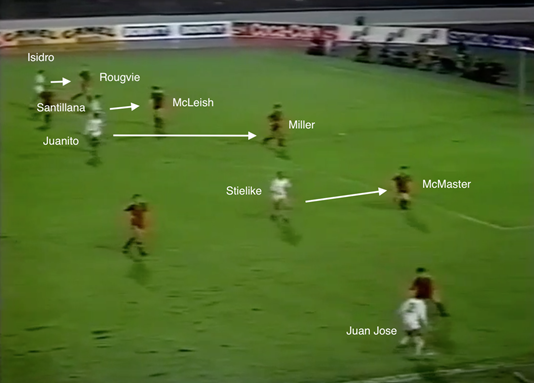
Madrid started to gain the upper hand possession wise and had Aberdeen pinned back in numbers for a spell. However, several crosses and through balls were unable to break down the center back partnership of McLeish and Miller.
In addition to the strong performance of the back four, a tough tackling display by Simpson in midfield was a key reason for the Dons holding strong on the defensive end throughout the game.
Aberdeen managed to gain some respite and went on the offensive when McMaster swung over a cross from deep, but a foul by Doug Rougvie on goalkeeper Agustin ended the threat.
Winger Juanito continued to float inside and picked up the ball centrally to tee up Stielike and the German international’s shot was deflected behind for a corner. Juanito floated in the corner but powerful defender Miller hacked it clear at the front post.
Right back Juan Jose joined the attack once more and won Madrid another corner when his cross deflected out of play off the back of a recovering Weir. Juanito’s corner was headed back across goal to Isidro who glanced a header wide of the target.
The game reached halftime with the score locked at 1-1 and Aberdeen manager Ferguson would have work to do at the interval. After an impressive start from the Scottish team, Madrid had very much settled into the game and started to dominate possession while pinning Aberdeen back into their own half.
German international midfielder Stielike was a key figure for Madrid, joining the attack well, connecting passes and also dropping deep into the backline to receive possession. Stielike either moved between the center backs, or into the pocket of space vacated by right back Juan Jose pushing high, allowing him to face and play forward under minimal to no pressure from the Dons midfield.
The first attack of note in the second half came when Madrid won a wide free kick for a foul by McMaster on the increasingly influential Stielike. Midfielder Gallego swung the free kick into the penalty area where Juanito directed a header wide.
Aberdeen’s first attack after the interval was started by livewire winger Strachan as he drove past the halfway line on the dribble before bouncing a pass off McGhee and spraying a good pass out to the opposite flank. Weir received possession on the left wing and had his cross deflected high into the air before it fell to Strachan who forced a good save out of Agustin with a well hit volley.
Left winger Weir had started the second half well and was soon on the attack again, winning a corner after a sliding tackle by Juan Jose. Weir took the corner and found Black who had his header stopped by a diving Agustin. The clearance went only as far as Weir, who sent in a back post cross towards Strachan before a driven ball back across goal was deflected into the safe hands of Agustin.
Aberdeen continued to focus on the left flank and won a crossing range free kick when Simpson was fouled by Stielike. The deep cross from the set play reached McLeish who set up Cooper to fire a shot from the edge of the penalty area that was saved by Agustin.
Weir’s influence continued to grow and he picked up the ball wide left yet again before dribbling past Juan Jose and another two Madrid defenders before his cross found its way to Black at the back post, only for the striker to miss a glorious chance by lifting his header over the crossbar.
Aberdeen won another wide free kick McMaster played a ball down the left sideline to McGhee and the forward was pushed in the back by Jose Antonio Camacho. McMaster stepped over the dead ball and Weir swung over the cross, only for Gallego to head clear and end the threat.
Madrid carved out a chance in the 70th minute when Metgod stepped out of the back in possession and threaded a pass to Juanito on the edge of the penalty area, but the resulting shot flew wide of the target.
With Aberdeen holding a very disciplined 4-4-2 shape, the Madrid central defenders looked to carry the ball forward and give the Spanish team an extra man in central midfield, or commit an Aberdeen player to the ball before passing forward.
Undeterred by the defensive pressure he was under, Juan Jose continued to push forward in attack and won a corner when his cross was headed behind by Rougvie. Isidro met the resulting corner in the air but his weak header nestled comfortably into the arms of goalkeeper Leighton.
At the other end of the field, Weir remained a threat and ghosted by Juan Jose yet again before his cross was spilled and then gathered at the second attempt by Agustin.
The game entered its tense final stages, and Aberdeen won a free kick 30 yards out from goal in the 83rd minute when McGhee dribbled by Juan Jose yet again before having his shirt tugged by Gallegos. Weir and Strachan ran a trick set play that saw them both run over the ball, before Strachan walked back and quickly took the kick in an attempt to catch the Madrid defenders off guard, only for his overhit cross to sail out for a goal kick.
Aberdeen continued to press for a winning goal and Simpson played the ball out wide to Rougvie, who had his cross headed over the crossbar by striker Black. Injury was added to insult after the miss by Black when he injured his ankle as he landed after the header, requiring significant treatment from the physio before resuming play.
Madrid were also going forward in search of a decisive goal, and Juanito drove a pass into the penalty area where Isidro took a touch past McMaster before firing a shot straight at Leighton. Goalkeeper Leighton launched a counter attack with a punt forward to McGhee, and the striker controlled the ball before playing to Strachan who charged past Metgod off the dribble and floated a chipped effort over the crossbar.
Goal scorer Black’s ankle injury would persist and eventually force him out of the game, with Ferguson replacing him with John Hewitt in the 87th minute.
As the clock ticked into the last minute of regulation time, Madrid won a corner when Juanito was tackled by McMaster at the byline. Juanito took the corner, but substitute Hewitt’s first touch was to prove an important one as he headed clear and sent the game into extra time with the score tied at 1-1.
Madrid coach Di Stefano made his first substitution before extra time kicked off, replacing left back Camacho with Isidoro.
It was Real who created the first chance of extra time when Santillana hooked a ball back across goal, before Isidro fired wide at the back post.
Aberdeen won a dangerous free kick in the 95th minute when Weir continued to torment Juan Jose and was fouled on the edge of the penalty area after cutting inside off the left wing. Weir appealed to referee Menegali about the number of fouls he was on the receiving end of, but found the Italian official to be slightly less receptive to discussion than the typical modern day referee!
The threat was ended when the free kick was taken short and an eventual cross from McMaster was headed clear by Stielike.
From the halftime interval onwards, the ability of Weir to beat defenders off the dribble as well as cut inside and provide service into the penalty area was a key factor in Aberdeen grabbing the upper hand as the game progressed.
Neither team were shy to push forward during the additional period in search of victory, and Madrid striker Santillana headed wide from a left wing cross just minutes later.
The game continued in end to end fashion, and Dons midfielder Simpson skipped past Stielike and drove down the left channel before sending over a low cross. Cooper attacked the cross but no penalty was given when he went down under contact from Isodoro at the back post.
Aberdeen were soon on the attack again and Hewitt fed Weir who won a corner under a challenge from Stielike. Weir’s corner was flicked on in the front zone by McGhee but the ball looped over everyone on the way out for a goal kick.
The pressure from Aberdeen continued, and they won another corner when impact substitute Hewitt was played in down the right flank before being on the end of a sliding tackle from Bonet. Weir swung in a corner that was met by the head of Rougvie, forcing a smart save from Agustin low to his left.
Madrid coach Di Stefano made a second substitution in the 103rd minute, replacing Isidro with Jose Antonio Salguero.
Midfielder Angel pushed forward for Madrid as the first half of extra time ticked down, finding the feet of Juanito who teed up Santillana, only for the forward to have his shot deflected wide. Juanito’s subsequent corner found Santillana at the back post, but his firmly struck shot was saved by Leighton.
The game reached the interval of extra time still at level pegging, but both teams seemed intent on pushing forward to find the decisive goal with neither side settling back into a defensive shell.
The second half of extra time started in familiar fashion with Weir picking up the ball around halfway before dribbling by three defenders and whipping over a cross that ended up in the hands of Agustin.
Aberdeen found the decisive goal in the 112th minute, and it was unsurprisingly Weir who started the move when he won a tackle inside his own half and played a pass forward to McGhee down the left flank. Striker McGhee drove forward before whipping a pinpoint cross for Hewitt to head home and send the travelling Aberdeen fans into raptures.
With their tails now up, the Dons almost added to their lead a minute later when McGhee split two defenders and raced in on goal, only for Agustin to come off his line and make the save.
As Madrid pushed forward in desperate search of an equalizer, they left room to be countered upon, and Aberdeen almost capitalized when Simpson played in Hewitt who squared for McGhee only for the striker to fire his shot straight at Agustin.
Despite Madrid being the team in need of a goal to get back in the game, it was Aberdeen who carried the greater scoring threat as time ticked down and Simpson fired a shot wide after being teed up by Hewitt.
Madrid did carve out one last chance when a foul by Miller on Angel 20 yards out awarded the Spanish giants a shooting range free kick. Juanito tried to take the free kick too quickly and referee Menagali awarded Madrid a retake after a premature shot before the whistle trickled into the arms of Leighton. Salguero took the free kick off a long runup and blasted a thunderous shot wide of the goalpost.
Goalkeeper Leighton sent the resulting goal kick high and far as the final whistle blew, leaving Aberdeen to celebrate their first ever European trophy.
POSTGAME FALLOUT
As well as being the first ever European trophy for the Dons, this victory marked only the second UEFA Cup Winners’ Cup triumph by a Scottish team, following up on Glasgow Rangers beating Dynamo Moscow 3-2 in the 1972 final.
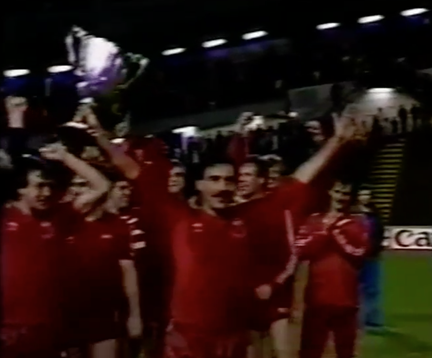
After this game, Aberdeen would go on to finish in 3rd place of the Scottish Premier Division, the Dons finished a point behind champions Dundee United despite an emphatic 5-0 hammering of Hibernian on the last day of the season.
Aberdeen would end the 1982/1983 campaign by adding more silverware on May 21st, when Black returned from his ankle injury and scored the decisive goal in a 1-0 Scottish Cup Final triumph over Rangers.
This victory would also qualify the Dons for the European Super Cup Final, a trophy they would win in December 1983 by sealing a 2-0 aggregate win against Hamburger SV over two legs.
Listen to a full length interview with central midfielder Neil Simpson on Aberdeen’s road to the final, insight into the game and the following seasons under legendary manager Alex Ferguson by subscribing to our Retro Football Analysis Podcast.
This game followed last day heartbreak in their La Liga campaign for Madrid, and would not be the last disappointment for the Real fans in a disappointing end of the season. Madrid lost the Copa Del Rey Final 2-1 against arch rivals Barcelona on June 4th, before falling 4-3 over two legs to Barca in the Copa de la Liga Final later that same month.
SCORING SUMMARY
7’ ABE Eric Black (Alex McLeish) 1-0
15’ REA Juanito PK (Santillana) 1-1
112’ ABE John Hewitt (Mark McGhee) 2-1
MAN OF THE MATCH
#11 Peter Weir (Aberdeen) – Wonderful performance from the left winger, particularly during the second half and extra time where he tormented Juan Jose off the dribble and was a focal point of the Dons attack.
STAR MEN
Aberdeen
3: LM Peter Weir – Man of the Match.
2: RM Gordon Strachan – A driving force in the midfield, Strachan defended well, beat players off the dribble and sprayed some good passes around in the attacking half.
1: CF Mark McGhee – Hard running performance at the front from McGhee who peeled into the left channel and sent over the cross for Hewitt’s historic winning goal.
Real Madrid
3: CM Uli Stielike – Driving force in the heart of midfield for Madrid, the classy German international defended well and conducted possession for Los Blancos.
2: GK Agustin – Quality performance from the goalkeeper, who came up big for his team with a string of athletic saves throughout the game.
1: RM Juanito – Tricky winger who floated inside to create problems for Aberdeen, capped an impressive performance with his team’s only goal from the penalty spot.
LINEUPS
ABE: Leighton, McMaster, Miller, McLeish, Rougvie, Weir, Simpson, Cooper, Strachan, McGhee, Black (Hewitt).
REA: Agustin, Camacho (Isidoro), Bonet, Metgod, Juan Jose, Gallego, Stielike, Angel, Juanito, Isidro (Salguero), Santillana.
Data Report
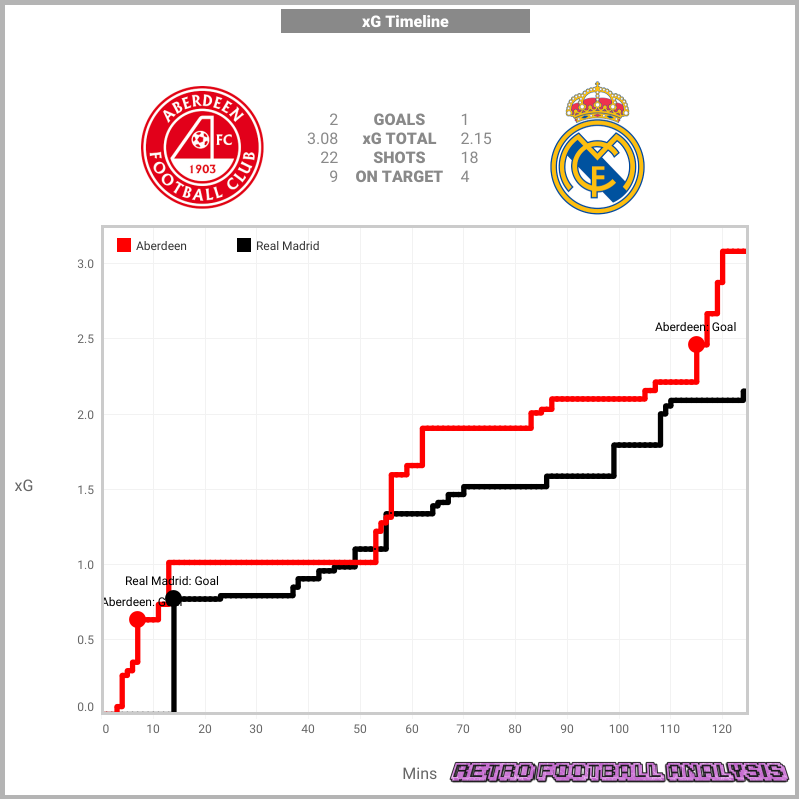
xG Timeline:
From the timeline we can see Aberdeen make an absolutely excellent start to the match, with 7 attacks on goal in the opening 15 minutes. The goal comes after their 5th attack, and they were very unfortunate not to add to this tally during this period.
Real Madrid’s penalty was their opening shot on goal of the match, however it would take until the remaining 10 minutes of the half until they were able to wrestle back control of the attacking flow of the match.
Real Madrid were the more consistent attackers throughout the match averaging an attack every 12 minutes. With that said it was Aberdeen who created chances that had the higher probability, but more importantly in phases of the game that mattered most. We see that they bettered their opponents xG in both the 2nd half of regulation time and throughout extra time, which gives us an idea of how potent their attack was despite enjoying less of the possession.
Aberdeen would create the games’ most “big chances” (Opta def: A situation where a player should reasonably be expected to score, usually in a one on one scenario or from very close range when the ball has a clear path to goal) recording 5 in total throughout the match. We can see from the timeline graph that they would have more opportunities that really moved the needle and caused bigger upticks than Madrid, added to this they would hit 3 of their 5 big chances on target. Two of these three big chances on target would result in goals, which shows us that not only did Aberdeen create good chances in the game they were also clinical in finishing them when it mattered.
Real Madrid’s data is naturally skewed by the valuation given to their Penalty (76% chance of success and 0.76 xG), which if we deduct it from their score shows us the value of their attack play reduces to 1.39 expected goals. Looking at the data we can deduct that Madrid got themselves into decent situations throughout the match, but when we get into what they did with these attacks it will paint a different picture entirely.
Type of Chances Created
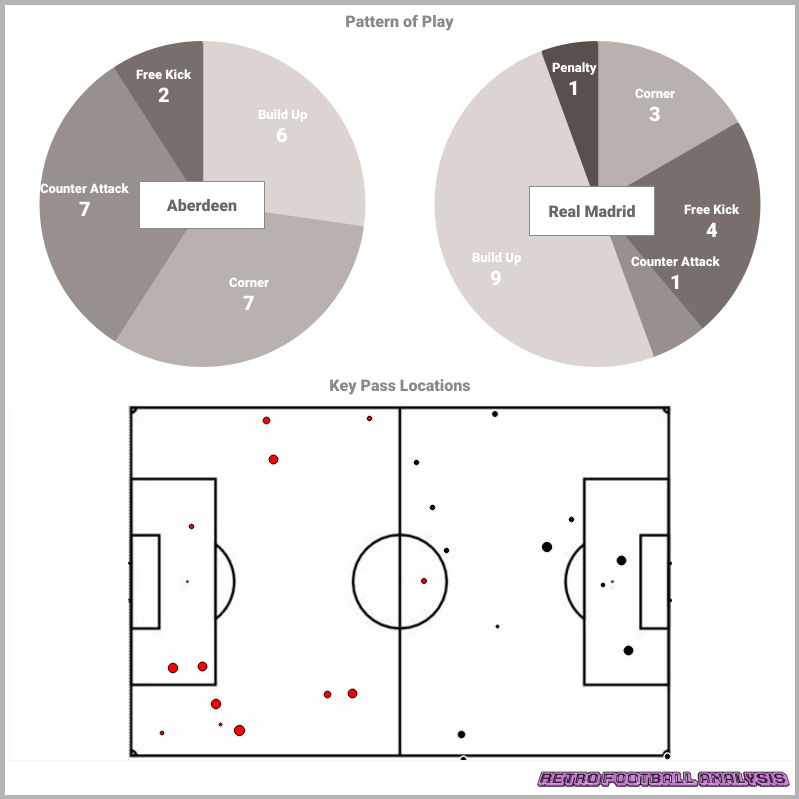
Real Madrid favored a more patient build up play approach, however it was their inability to stretch Aberdeen that prevented many of these attacks from troubling their opponents goal. The set up play from inside the box was often a flick on or a knock down, where as the key passes from the center of the field came later in the game when they had ran out of ideas and resorted to knocking balls into the box from distance.
Aberdeen were far more comfortable playing on the counter, which is evidenced not only by the amount of attacks they generated from this pattern of play, but also spoke to the amount of crossing opportunities they were able to fashion from the high wide left position for Peter Weir to deliver into the box.
We can also see that Aberdeen were very strong from set plays, not only in their organization and set up, but also physically with Miller, McLeish, Rougvie, McGhee and Simpson all very strong in the air when attacking crosses. Overall Aberdeen would create 13 attacks from crosses in the match, which returned 5 shots on target, a very solid return from a team who wanted to advance forward quickly and create chances inside the opponent’s box.
Where Chances are Created?
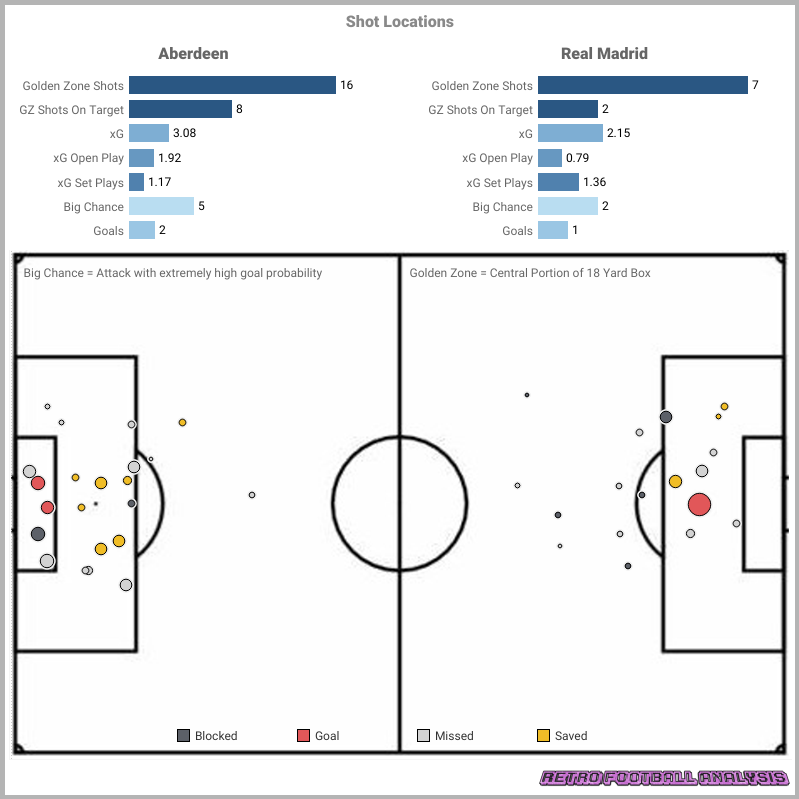
The shot map was an interesting read on a number of levels. Primarily we see that Aberdeen created almost 13 of their 22 chances (59%) inside the Golden Zone (The central portion of the 18 yard box). In comparison their opponents would only create 6 of their 18 shots within the same space (33%). We can drill into this further by assessing shots on target, with Aberdeen hitting 8 on target from the Golden zone, which was double the amount of shots on target Real Madrid would register across the whole field (4 in total).
If we break down Aberdeen’s expected goals we can see that they had a nice variety to their attack play, splitting their xG between open play and set plays (1.92 & 1.17 respectively). This shows us the threat they carried throughout the match, and were not reliant on a specific way in which to win the game. If we compare this to Real Madrid we can see that the value of their attacks from open play was actually less than that of their set pieces, even when we take into consideration the value of their penalty (0.75 xG). Madrid havent set up to play for attacks through set pieces therefore it illustrates how well Aberdeen have defended in the game, as they were able to nullify much of Madrids approach play before they entered the final third.
The last piece I’d like to look at is each sides expected goals on target. xG Calculates the probability of the shot from the location in which it comes from, not its outcome, therefore when we factor in how much of each sides xG actually hit the target it makes for interesting reading. Aberdeen recorded an xG value of 3.08, however their xG on target comes in at 1.43. This shows us that 46% of Aberdeen’s chance creation is testing the goalkeeper. When we analyze Madrid and their attacks out with the penalty, it tells a different story completely. Instantly their xG on target goes down to 0.35 and shows us that only 25% of their chance creation is actually testing the keeper.
Who Created Chances
Aberdeen’s best statistical attacker would be Eric Black. He had 6 attacks on goal in the match, 3 of which were on target, returning 1 goal. His personal xG value was 0.99, which accounts for 1 third of his teams attack play.
Juanito would be Real Madrid’s best statistical attacker, returning 1 goal from his 4 attacks on goal in the game, and a personal xG of 0.99 also. Additionally he would set up 5 more attacks for his teammates, two of which would result in a shot on goal.
Match Simulator
We fired up the RFA Match Simulator to replay the match 1000 times, and in doing so calculating the accumulative win percentage based on the probability of each shot. Here are the results:
